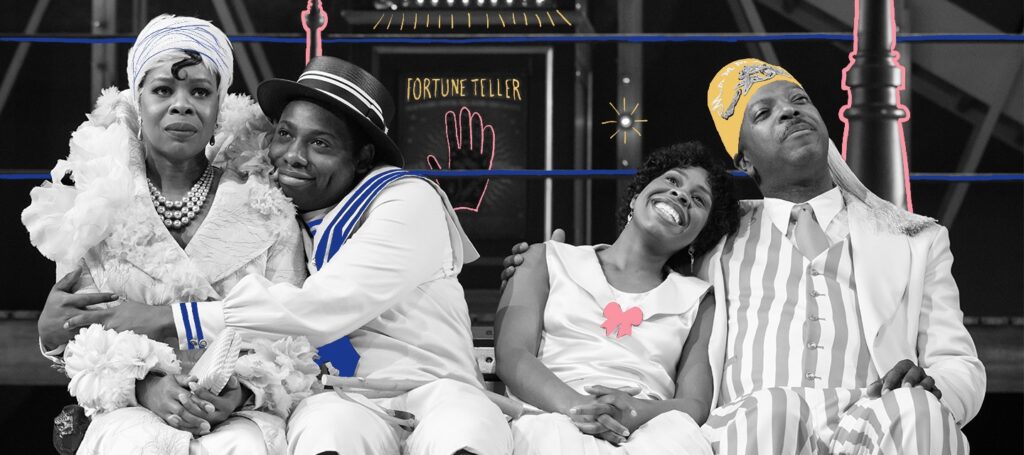


A Glorious “The Skin of Our Teeth” Invites Us to Reflect on How Far We’ve Come
The events that take place in Thornton Wilder’s The Skin of Our Teeth practically cover the entire history of humankind, from the prehistoric ice age to 1950s New Jersey, to the immediate present. Thanks to Lileana Blain-Cruz’s inspired directorial vision and playwright Brandon Jacob Jenkins’ new material, an already prophetic text turns into something that’s even more palatable to an audience with a 21st-century cultural context.
The world Wilder created at the heels of his Our Town success was never meant to be a linear thread, but one where time collapses into itself, where the future is the past, the past is murky waters, and the present is a whirligig of anachronistic materials as the characters convalesce after skidding by a permanent succession of disasters. It’s gut-wrenchingly relevant today as we collectively find moments to inhale, and exhale, before bracing for the next impact.
We meet Mr. and Mrs. Antrobus (James Vincent Meredith and Roslyn Ruff) of Excelsior, NJ in the thick of it, they live in a house that seems to be the final stronghold of humanity against a looming iceberg. A house that is meticulously decorated with mid-century furniture, and tropical greeneries, where their maid Sabina (Gabby Beans) dusts and tidies in preparation for the patriarch’s homecoming. She soon, however, breaks a façade of exuberant stock speech to reveal to the audience that she, Latasha Somerset (still Beans who plays Latasha who plays Sabina), doesn’t understand a word of this incredulous play, and only returns to her “blocking” when the Stage Manager, Fitzpatrick (Anaseini Katoa*, who nails the portrayal of an all-too-familiar sight of the tired mom figure of the company).
After that, of course, the fourth wall is but gossamer as you realize that, yes, here we are in the Antrobus’ house, that’s also the Vivian Beaumont Theater, that’s also Elia Kazan’s rehearsal room at the Shubert in 1942, that’s also Blain-Cruz’s in 2022.
The Antrobuses, we learn, are survivors. In each act, we watch them escape certain death (“by the skin of our teeth” as the title suggests): the Ice Age in Act I, the deluge in Act II, and the war in Act III, and come out the other side bruised by undefeated. It’s clear that the play is made of grand concepts and comments on the state of human survival on a universal scale. The name Antrobus itself comes from the Greek word anthropos: human.
There are also obvious implications of the characters’ biblical connections: George and Maggie Antrobus (a commanding and grounded Ruff) are the American suburban Adam and Eve (he calls her dear Eva in their wedding anniversary song); their son Henry (Julian Robertson) used to be named Cain, and the play is sprinkled with mentions of his fratricide of Abel. However, it’s important to point out the specific choice of the Antrobuses in this production being a Black American family, which further intensifies the notion of them being a symbol of resilience.
Wilder used the King James Bible as a framework for the play’s narrative. However, the play is more about the storytelling aspects of the Bible as an inspiration of arts that sustain us even in the face of the apocalypse. At the end of Act I, the refugees who come to the Antrobus’ door are artists, among them is Homer (yes that Homer) who sings the song of The Iliad, Vyasa recites words of creation from the Rigveda, as does Moses, albeit from the Bible… and when the end comes, they huddle around a fire they’ve built by burning everything, including audience seats, but books (per Mr. Antrobus’ request), the singers crooning “Jingle Bells” ever so softly.
The production is also a marvel of spectacular designs. In Act I, the family’s pet mammoth and brontosaurus are both puppets operated by the ensemble (Jeremy Gallardo, Beau Thom, Alphonso Walker Jr., and Sarin Monae West). James Ortiz, whose The Woodsman remains one of my all-time favorite theatrical experiences, designed and directed the large-scale, fully mobilized puppets that tuck on your heartstrings with their papier-mâché faces.
Adam Rigg’s multiple sets are each more aesthetically extravagant yet not without reason. There is no dead space in those sets, each element serves a unique function and you never know which part of it might transform into something else: a house that both expands and shrinks in Act I; a 5-story high, functional waterslide behind the Atlantic City boardwalk in Act II; and an overgrown marshland behind the half-crumbled house in Act III. The textures of the sets are further enhanced by Yi Zhao’s dynamic lighting, as well as complemented by Montana Levi Blanco’s costumes. Special attention should be paid to Palmer Hefferan’s sound design as well, who not only created impressive and seamless effects that enhance the environments of the play but also elevated the magical realism aspects of the storytelling with clever voice augmentations.
Before each act, the production also uses a framework that roots the point of view of the story in the now (Lincoln Centre Theater takes up the role of the presenter) with a Dadaist style newsreel (Hannah Wasileski’s masterful projection design on a screen that takes over the whole stage, old-timey cinema style), featuring animated versions of the characters, their surroundings, and objects of note (Mr. Antrobus’ inventions, for instance). In a strange yet perhaps apt sense, each act can be treated as the beginning of the whole play.
I can sing praises of the cast until my ink runs dry, but it’s simply impossible to point out all the standout moments in an ensemble that runs together like a well-oiled machine. The archetypal characters are portrayed with care, and thus become memorable, and of course, Bean’s Sabina as the character who becomes our psychopomp in the story is a legend in the making.
Written and premiered in 1942 in the heat of WWII, The Skin of Our Teeth is a culmination of who Wilder was up until that point: the overly intellectual child who grew up both in America and China, where he witnessed political uncertainties at a young age, a student of ancient cultures of various kinds, and a soldier who saw the horror of WWI. So, when Act III grounds us in the scorched ruins of the Antrobus’ family house after the war, we know we’re standing on the eve of another beginning: dust off the old books, even the German ones (which is probably more significant a detail in 1942 than 2022). We know what happens next.
Sabina, well, Latasha, says that she doesn’t “understand a single word” of the play; she reminds us of this over and over again, because it’s probably the reaction certain audience members would have as well. But the truth is, there’s no need to understand the play – it’s not what it sets out to do anyway. You might leave the theater having already forgotten about its enigmatic characters and intricate play-within-a-play narrative designs, but The Skin of Our Teeth will stay within you for the long haul, and the simple messages at its core will emerge – someday, when you’re standing in line at the bank, or sipping coffee in the morning, or at the face of despair, teetering between surrender and resistance.
“There’s no time to lose.” Says the fortune teller who doesn’t understand the past but holds every certainty about the future, “Start a new world. Begin again.”
To ask whether the play is relevant today would be like asking whether the Bible is still relevant, not as a reference book to argue about the existence of God, but rather, as evidence of how far we’ve come as a species, as a reminder to have hope and to care for each other – because disasters come, they always do. But we begin again.
*understudy of Donnetta Lavinia Grays
Keep Reading

This ‘Funny Girl’ Has Laughs but No Lushness
Before we get to my thoughts on the Beanie Feldstein-led revival of Funny Girl, there are some things I have to confess. I used to love Glee. I loved Lea Michele on Glee. I loved Lea Michele as Rachel Berry as Fanny Brice in a (fictional but prescient) Broadway revival of Funny Girl on Glee. […]
Read More
The “Hangmen” Martin McDonagh Wrote Lack Accountability, but Should the Play Get Away with the Same?
Hangmen, by Martin McDonagh and directed by Matthew Dunster begins on the day the Murder (Abolition of Death Penalty) Act was passed in England in 1965. Harry (David Threlfall), a former hangman who runs a pub in Northern England, is suddenly sought after by the press who want to know his thoughts on the historic […]
Read More












